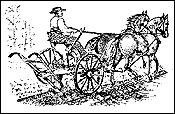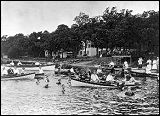“Work of significance - in offices and schools, factories and farms, government agencies or inner-city neighborhoods - has been the way diverse people have forged connections with each other and addressed the nation’s problems. Through such work people gain visibility, authority, and larger intellectual horizons. People become creators of their communities, stakeholders in the country, and guardians of the commonwealth through common work.”
The prevailing “work ethic” was a driving force that bound together and motivated the diverse citizens who forged the history of Minnesota. After World War II, “a ‘new gentry’ of professionals and experts, long in formation, came into their own. Institutions increasingly took on the character of service providers, in which experts sought to fix people and solve problems for clients. A consumer culture, itself manipulated by experts, replaced the existing philosophy of the value of work in building community.” [BA] |
|
|
Transitions from
Producer to Consumer



Chapmans, Lake Minnetonka, ca. 1900
Minnesota Historical Society
|





